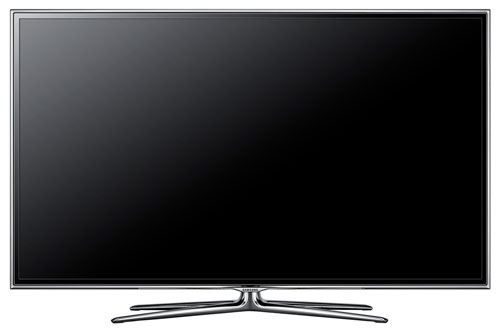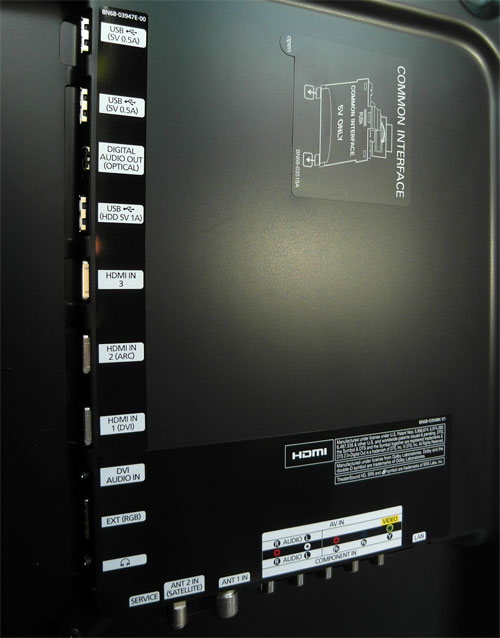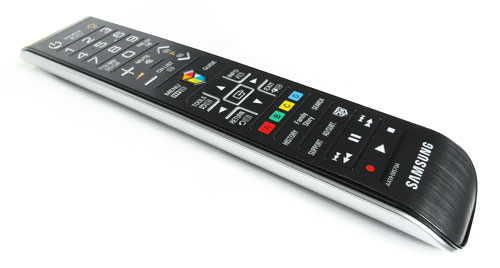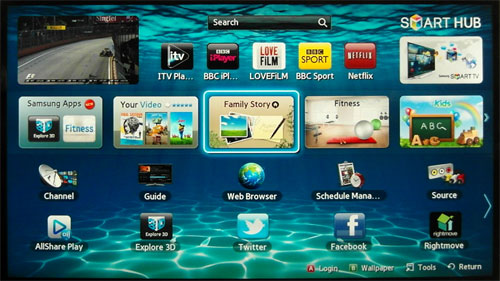Being the world’s largest television manufacturer by shipment volume, as well as the one responsible for seeding the popularity of “LED TV” displays among consumers, Samsung Electronics understandably offers a huge selection of such TVs to cater for all needs and budgets. The ES6800 is part of the Korean brand’s Series 6 lineup for 2012, sitting a couple of rungs off the flagship ES8000 series, and one step below the ES7000.
<!-- google_ad_client = 'pub-2887677957235196'; google_ad_slot = '4990177225'; google_ad_width = 336; google_ad_height = 280; //-->
Today we’re reviewing the Samsung UE46ES6800, which is the 46-inch model within the range. A glance at the specification sheet reveals the inclusion of dual Freeview and Freesat HD tuners, edge LED backlight technology, active-shutter 3D capabilities, and Smart TV functionalities bolstered by integrated WiFi, but the omission of gesture/ voice controls and built-in webcam/ microphone (for Skype use) which are available on the step-up ES7000 series. Let’s see if we can uncover any more difference through our battery of tests, especially in terms of picture quality.
Note: The specific unit we tested was the UE46ES6800UXXU, which denotes the UK 3-pin-plug version. Even though we did not review the smaller, 40″ Samsung UE40ES6800, there shouldn’t be any drastic difference in performance given that they both share similar specifications except for screen size.
By Samsung’s standards, the stylistic cues implemented on the UE46ES6800 are relatively conservative. At 13mm wide, the bezel is more dimensionally endowed than those almost invisible ones found on the ES7000 or ES8000, but still manages to remain unobtrusive since its black finish is not as glossy as most others.

Like most edge-lit LED LCD televisions, the 46ES6800’s chassis is impressively slim. The LCD screen exhibits a slight sheen, though is far from reflective. The company’s trademark translucent plastic trim makes an appearance here too, covered by a chromium-plated fringe.
The chrome finish extends to the four-pronged table-top stand, giving a flowing sense of continuity. As was the case with the UE40ES7000, we had trouble lining up the supplied screws with the holes on the back of the television – a sign of inferior workmanship. It is best to follow the given instructions by laying the panel flat (LCD screen face down) on a soft surface, and then assembling the stand. Fortunately this is a once-off process that doesn’t need to be repeated beyond setup.
Samsung has reduced the number of HDMI inputs on this year’s HDTV models – including even the top-end ES8000 series – to three, and the ES6800 is no different. A strange decision, we must say, considering that most competitors seem to offer four HDMI ports on their midrange and high-end displays.
 |
| 3 x HDMI, 3 x USB, Component, SCART, aerial, Freesat, ethernet & audio outs |
The Samsung UE46ES6800 comes with one of the nicest clickers we’ve seen in recent times. The buttons are embedded within the same plane as the surface (and so are not protruding out), yet still deliver extremely satisfying tactile feedback. The front surface sports a faux brushed effect, which is brilliant because it does not pick up fingerprint nor dust. And the remote can even be backlit at the press of a button.

We would have appreciated the presence of a dedicated [Aspect Ratio] key, but all in all this is a wonderful effort from the Seoul-headquartered firm – one that wouldn’t look out of place if shipped with a flagship TV.
It’s fair to say that Samsung’s internet-connected portal (dubbed “Smart Hub” by the company) boasts the most comprehensive suite of Smart TV apps available on the market at this time of writing. All the major video-on-demand (VoD) services, ranging from BBC iPlayer and ITV Player to Lovefilm and Netflix, can be accessed through the platform once the television’s firmware and Samsung Apps are updated to the latest version.

The UE46ES6800 features inbuilt wireless connectivity for hooking up to your home broadband network, which greatly increases the chances that the Smart television functions will be used. The cuboid-shaped [M] button that summons the Smart Hub interface is located centrally on the remote control (perhaps too well-placed, since we’d repeatedly press the key by accident when calibrating the TV in the dark!).
| Jump To: 1. DesignNext: Calibration3. Performance |
jQuery(document).ready(function($) { var toc = $("#tableofcontents").html(); $("#tablecontents").html(toc); });